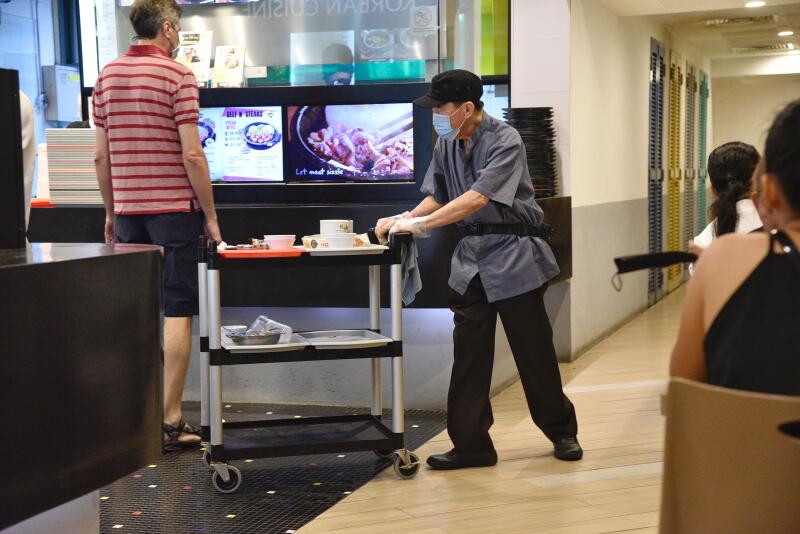'We are our brothers' keepers,' says Tharman on raising incomes of low-wage workers
Sign up now: Get ST's newsletters delivered to your inbox

Mr Tharman said one of the silver linings of Covid-19 has been the greater recognition of the contributions of essential workers.
ST PHOTO: DESMOND WEE
SINGAPORE - Covid-19 has driven home the important role of essential workers, and a key challenge is to raise the incomes of such workers who are at the bottom of the ladder, said Senior Minister Tharman Shanmugaratnam.
Lifting their wages is in the interest of a cohesive society, and Singapore must tap the spirit of solidarity demonstrated during Covid-19 to push ahead and do better for them, he said on Tuesday (Jan 12).
"It can be done. It requires collective solutions, and it requires economic strategies that ensure we can continue to create jobs up and down the ladder."
Mr Tharman, who is also Coordinating Minister for Social Policies, was speaking at a forum on jobs and skills at the Singapore Perspectives Conference organised by the Institute of Policy Studies (IPS).
The other panellists were American economics professor Tyler Cowen from George Mason University and OCBC Bank chief economist Selena Ling. The session was moderated by Lee Kuan Yew School of Public Policy dean Danny Quah.
Mr Tharman pointed out that lower-income Singaporeans at the 20th percentile of the income ladder have seen their real incomes increase by about 40 per cent in the last 10 years.
Part of that, he said, was playing "catch-up" for the preceding decade, which saw low-wage workers bear the brunt of the dot.com bubble burst and Sars, followed by the global financial crisis.
Yet unlike other advanced countries where median wages have stagnated, middle-income Singaporeans have continued to pull ahead. Median incomes in Singapore have grown by 65 per cent in real terms in the last two decades - "reflecting our economic strategies, and our whole system of education and skills upgrading", he said.
Hence the challenge of helping the lower-income level up is much more pronounced in Singapore as those in the middle have seen a very significant lift in incomes, he said.
Sustaining income progression for a broad spread of workers requires a combination of approaches and not just a blanket minimum wage, he added.
These include expanding the Progressive Wage Model (PWM), or a "minimum wage-plus"; Workfare - which is effectively a negative income tax to boost the income of low-wage workers; and economic strategies to ensure jobs are being created for all and Singapore stays competitive.
Mr Tharman said the PWM and minimum wage differ not philosophically but in terms of their practical design and application.
"The majority of economists no longer have the presumption that minimum wage leads to unemployment. But the evidence is still disputed among economists, so neither can we make blanket statements that a minimum wage leads to no work loss.
"What matters is the actual level of that minimum rung, and how it affects the least skilled and most vulnerable in our workforce, rather than aggregate employment or averages," he said.
The context of each labour market hence matters, he said, citing how many countries are mainly concerned with younger workers when they talk about the effects of a minimum wage.
But in Singapore, it is the older generation of Singaporeans who are the group of greatest concern. Half of the bottom 10 per cent of workers are above the age of 55, and of these, two-thirds did not complete secondary school, he said.
They had done simple, lower-paying jobs for much of their lives, and have limited capacity to switch to better jobs if they were displaced.
This is why the Government is working with its tripartite partners to raise their pay through the PWM in a calibrated manner, to ensure they can remain at work.
"We are working on it sector by sector, together with skills upgrading, in a way that ensures that we get not just a minimum wage, but maximum employment," he said.
Mr Tharman noted that a sectoral approach to raising pay, instead of an across-the-board minimum wage, is not unusual internationally.
He pointed out that the PWM also seeks to avoid a situation that some countries face after they implement the minimum wage, which is a flattening of the wage profile within the firm as employers try to save costs.
"People are held at the minimum wage for a long period, which is not ideal from the point of motivation and rewarding those who upgrade their skills."
Mr Tharman added that one of the silver linings of Covid-19 has been the greater recognition of the contributions of essential and blue-collar workers.
"We've got to take advantage of that renewed spirit of solidarity as we go forward. We need more individual exceptionalism, we need more entrepreneurship, we need more innovation in every sector of our society, but we must do this with the strong sense that we are in this together.
"At the end of the day, we are all our brothers' keepers."


